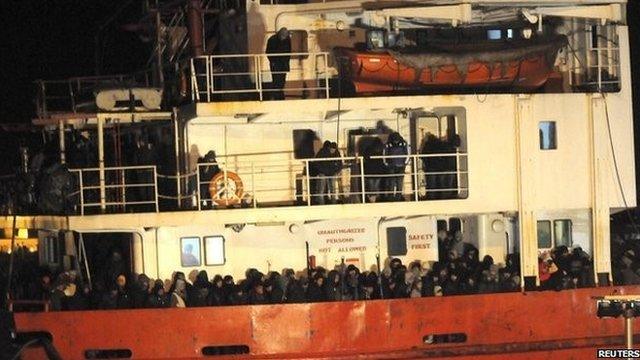Migrant ghost ships: Who are the people smugglers?
- Published
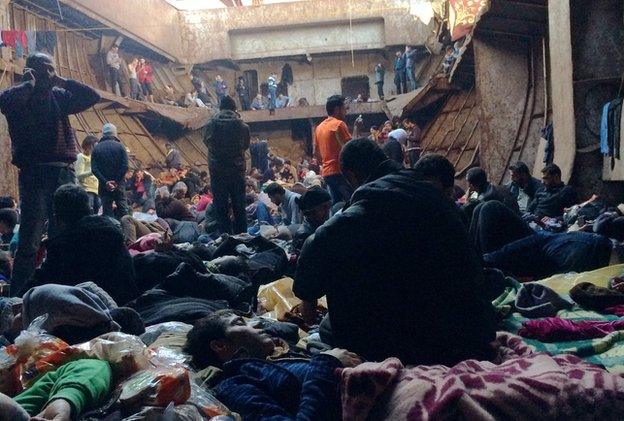
Smugglers squeezed almost 1,000 migrants into the bowels of the Blue Sky M cargo ship
Human traffickers are believed to have set the Ezadeen cargo ship on autopilot before abandoning it to continue at full speed across the Mediterranean with 359 illegal migrants on board.
Experts say it is part of a new tactic that has emerged in recent months, with smugglers using old freighters to transport hundreds of people - mostly Syrian refugees - from Turkey to EU countries.
Just days earlier, the Blue Sky M, carrying 970 people, was found adrift in Greek waters.
Who are the people organising these perilous journeys - and what is being done to stop them?
Organised crime
Officials say the Ezadeen was carrying the Sierra Leone flag, while the Blue Sky M was sailing under a Moldovan flag.
A previous case involved a freighter with the flag of Tonga, says Izabella Cooper, spokesperson for Europe's border control agency, Frontex.
But identifying the smugglers is not that straightforward.
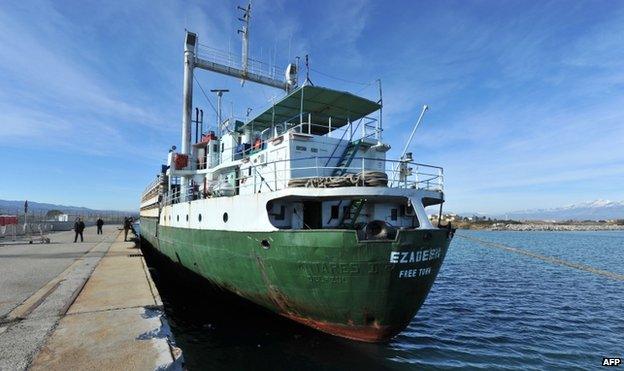
The Ezadeen was marked as being from Freetown in Sierra Leone
The ships' crews are thought to have come from countries including Russia, Egypt and Syria, according to Ms Cooper.
And they may be linked to criminal gangs operating on an international scale.
"People trafficking is an international crime," says Claude Moraes, MEP and chair of the Civil Liberties, Justice and Home Affairs Committee at the European Parliament.
"Part of it is still opportunistic. But as time goes on, it is far more organised and we see it linked to other crimes on the mainland."
'Profitable business'
The one thing investigators are sure of is the motivation for the smugglers - money.
Police in Italy believe traffickers made some $3m (£1.9m; €2.5m) from the Ezadeen, with each traveller paying between $4,000 and $8,000 to board the ship.
"Smuggling people is very profitable business - probably one of the most profitable in the world," says Ms Cooper.

Rani Sarkas
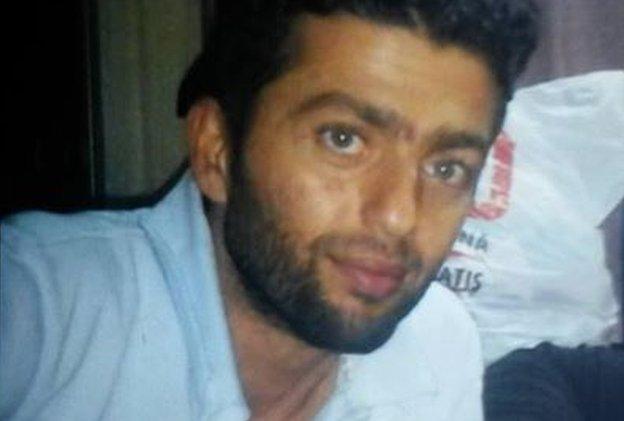
This image is believed to be Rani Sarkas, a Syrian migrant on board the Blue Sky M
Syrian migrant apparently found at the helm of the Blue Sky M when Italian coastguards boarded
Italian daily La Repubblica quoted the 36-year-old as telling police he was contacted in Turkey by human traffickers who had posted notices on Facebook
Said he was promised £10,000 ($15,000) and the possibility of sending his family to Europe in exchange for taking control of the boat once smugglers had abandoned it, according to reports
Previously worked as a ship's captain
Travelled from Mersin in Turkey, close to the Syrian border

Ms Cooper says it is such a money-maker that criminal gangs do not need to combine it with smuggling other illegal items.
"We don't see the ships carrying drugs or weapons.
"It's a business that is so profitable that it's worth the criminal organisations focusing on that only."
Easily purchased
Compared to the risks and cost the migrants themselves take on, the smugglers seem to be able to get hold of the ships quite easily.
David Osler, financial editor of maritime newspaper Lloyd's List, says scrap ships can be bought for around one million dollars (£550,000, 700,000 euros).
"Secondhand ships of the type used in the recent people trafficking cases can easily be purchased for less than the price of an unexceptional London flat," he says.
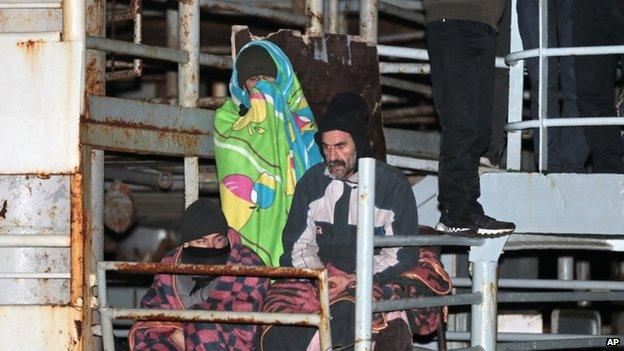
Most of those on board the Ezadeen appeared to be fleeing the conflict in Syria
There are regular auctions when shipping companies go bust, and old vessels are sometimes sold on online auction sites.
The BBC has also seen pages on Facebook offering services for buying and selling scrap cargo ships.
"Mostly the rock-bottom price for a ship is the scrap value, which is paid by tonne of recoverable steel," says Mr Osler.
But he says ships like these may not yield enough steel to make it worthwhile sailing them to India or Bangladesh for breaking.
"It's quite easy to imagine the smuggling gangs picking them up from friends for next to nothing."
So who is helping the people traffickers?
"There is no evidence of any involvement on the part of mainstream shipping companies in any of this," says Mr Osler.
"But as with every industry, there is obviously a small criminal fringe involved in activities such as smuggling contraband, narcotics and arms, and probably people trafficking as well."
'Ruthless travel agency'
Police in Italy say they arrested three people when coastguards managed to board the Blue Sky M.
According to reports in Italian media, one of them was Rani Sarkas, a Syrian migrant who said he had been paid £10,000 by smugglers to take charge of the ship once they had abandoned it.
"Although the Italian and other governments may be often proud of some arrests of 'boat drivers', the illegal migration bosses are still safely based in Turkey, Egypt, Libya, Pakistan, Syria, Italy," said Andrea Di Nicola, assistant professor in criminology at the University of Trento and co-author of the book Confessions of a People Smuggler.
"They are taking advantage of the weak points of certain laws and of border controls in Europe. Small fish are caught while big fish stay safely behind."
Mr Di Nicola spent more than two years following migrant routes to find out who is running what he calls "the most ruthless travel agency on the planet".
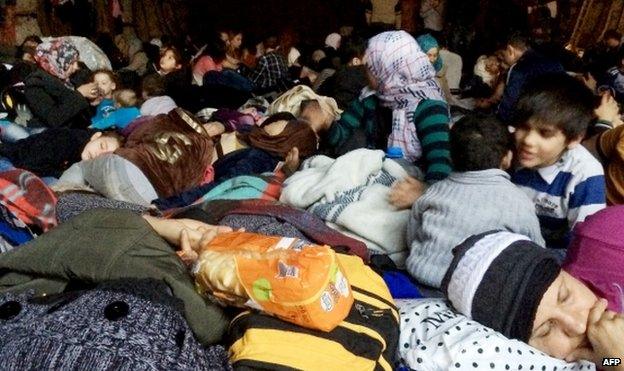
The migrants are often forced to travel with no food or water
He says using cargo ships is the "perfect way to smuggle asylum seekers since they do not need to be hidden.
"The opposite - they need to be intercepted and rescued."
'Incredibly dangerous'
"The problem is that the smugglers are actually operating relatively freely," says Mr Moraes.
He says EU member states deal with the trafficking situation once it becomes a domestic issue, so when the migrants arrive.
But the problem is that different countries have different criminal codes.
And physically stopping these migrant ships is also very hazardous.
"This is an incredibly dangerous modus operandi that we are seeing," says the Frontex spokesperson, Ms Cooper.
"In latest case, the ship was abandoned and set on autopilot and no one was able to stop it.
"It was only when fuel ran out that rescue crews were able to board it."
- Published4 January 2015
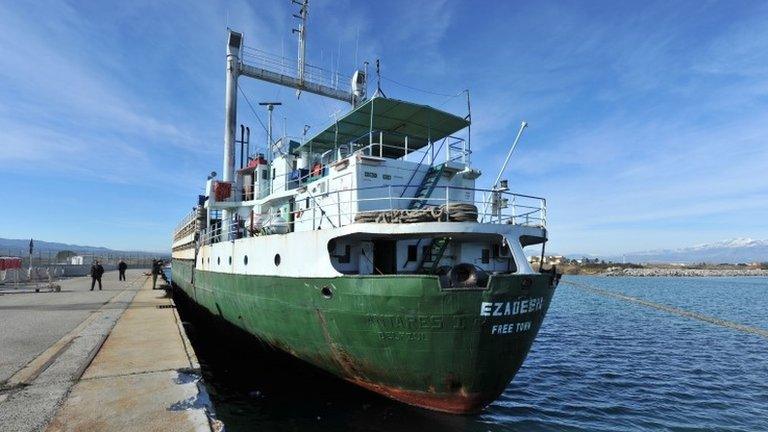
- Published3 January 2015
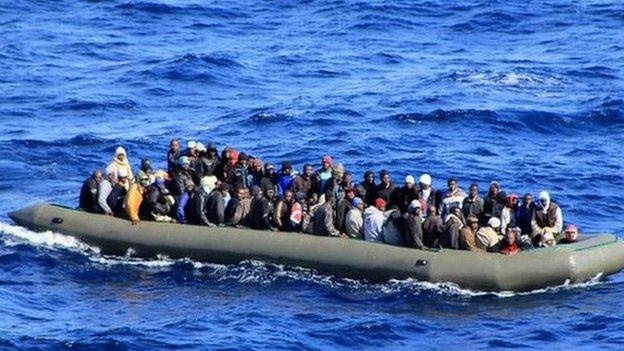
- Published31 December 2014
